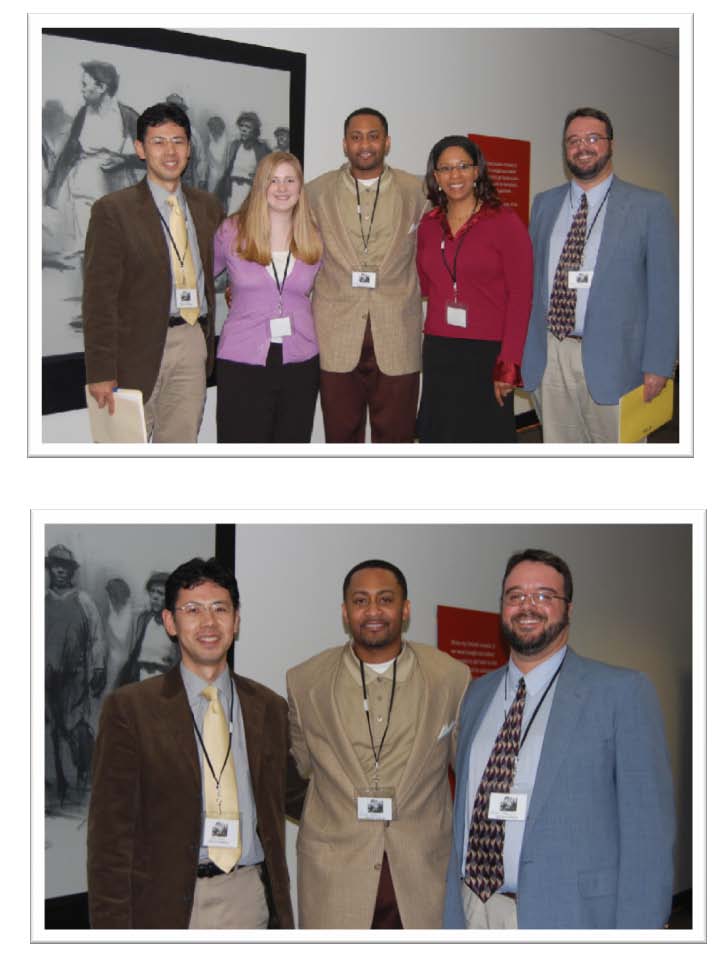You are on CGS' Legacy Site.
Thank you for visiting CGS! You are currently using CGS' legacy site, which is no longer supported. For up-to-date information, including publications purchasing and meeting information, please visit cgsnet.org.
7. Rhetoric: Enhancing Diversity and Inclusiveness
The PhD program in rhetoric has established a pipeline with the Memphis Theological Seminary to recruit African American scholars into the program. The Department used the CGS/Peterson’s grant to sponsor a conference on the rhetoric of Martin Luther King, Jr. As part of the on-going relationship between the Department and the Memphis Theological Seminary (MTS), MTS co-sponsored the event. Additional funding came from Departmental funds, and the University’s Student Government Association. The conference was held on April 1, 2008, at the National Civil Rights Museum and was coordinated with a host of other activities and events commemorating Dr. King. The conference was advertised extensively to the general public, to the students at the University, and to students at other colleges and universities in the area. Lodging for students who came from outside the immediate Memphis area for the evening was provided before the conference began. A particularly large contingent of students (about a dozen) came from the University of Central Arkansas under the supervision of Professor Donna Barnes.
The conference was divided into four main sessions. The first was an opening address by Dr. Frank Thomas, Senior Pastor of the Mississippi Blvd. Christian Church and a former Fellow supported by the 1st Generation Ph.D. Fellowship program (formerly known as the Tennessee Board of Regents Minority Fellowship program). Dr. Thomas, who was then completing a PhD dissertation on King’s rhetoric, provided an in-depth analysis of King’s last speech, the “I’ve Been to the Mountain-Top” address, delivered on April 3, 1968. The second session consisted of presentations by five students from MTS and the Department’s graduate program. These presentations were adapted from papers that the students had prepared for a joint MTS and Department of Communication seminar in the Fall of 2007 on Dr. King’s rhetoric. The third session came after a lunch break and featured Dr. Maxine Smith, a pioneer in the Memphis civil rights movement. After a short speech reflecting on King’s legacy in Memphis, Dr. Smith joined a panel of faculty and graduate students from the University in a discussion that soon included members of the audience. The final session involved a meeting in which undergraduate students met with the graduate students who had presented their papers earlier and with MTS and University faculty for a discussion of King’s rhetoric and its significance. In all, seven small groups participated in these discussions. Following this last program, the Dean of the College of Communication and Fine Arts, the President of the National Civil Rights Museum, and the Chairman of the Memphis Tourism Education Foundation hosted a reception.
More than 100 people attended the conference including students and the general public. The response of the audience was lively and engaging. Perhaps the best indications of the success of the conference came from Professor Barnes of Central Arkansas. As she left to take her students home, Professor Barnes remarked that the conference was exciting and productive and that she hoped the University would sponsor similar meetings in the future that she and her students could attend. Dr. Thomas’ presentation stimulated a discussion that considered various facets of King’s preaching, his theology, and his relationship to the traditions of the African American Church. The student panel sparked an equally interesting discussion. Of special interest were comments from those who had been involved in civil rights activism during the time King had visited Memphis. Several of the student presentations argued that King’s message had become increasingly strong and radical during the last few years of his life, and this judgment was confirmed by those in the audience who had heard or communicated with King in Memphis during the crisis of the sanitation workers strike.
Gauged by the reaction of students, the highlight of the conference was the presentation of civil rights pioneer and leader, Dr. Maxine Smith. Audience members were fascinated by the story she told about the civil rights struggle and admired her as a model for emulation. Several students made a special point of thanking the conference organizers for including her in the program. More importantly, African American doctoral students were recruited into the PhD program in rhetoric.

2008 Conference on the Rhetoric of Martin Luther King at the 40th Anniversary of his Assassination
(Photographs courtesy of Dr. Michael Leff, Former Chair of Department of Communication)




